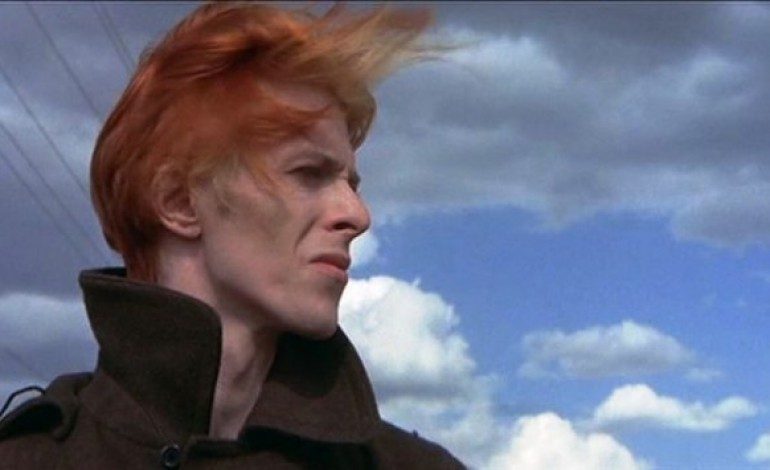

The passing of David Bowie has seen an overflowing of tributes, befitting such a groundbreaking, once-in-a-lifetime iconoclast. For who else has conquered the worlds of music, film, fashion and celebrity with such brashness, such daring and polysexual charisma. We at mxdwn mourn the loss of this unforgettable titan and celebrate the life of a man who wrote the soundtrack for many generations. Bowie brought his singular artistic powers to the silver screen as a performer rather selectively (like the spotting of a rare bird on a nature walk) but captivated in that strange, beatific way only a transcendent star ever could.
The nature of performance has always been a part of the legend of Bowie, perhaps because before he took the music industry by storm he studied avant-garde theater and trained as a mime. He made his film debut in the 1967 horror short The Image portraying a ghostly boy who comes to life out of a painting to haunt the artist who conceived him- from the beginning there must have seemed an almost otherworldly quality to his presence and magnitude. It was his leading role in The Man Who Fell to Earth (1976) that really first capitalized on Bowie’s cinematic potential. Portraying Thomas Jerome Newman, an alien being (appropriately enough) who comes to Earth to try and procure water for his dying planet, bigger Bowie mythmaking started to take shape and director Nicholas Roeg (Don’t Look Now) was the perfect provocateur to frame this ambiguous and beautiful creature.
While The Man Who Fell to Earth earned only mixed reviews upon release, the film has grown a strong cult following, befitting to such a strange and beguiling feature film. Bowie followed up with the World War I drama Just a Gigolo (1978), which was directed by icon David Hemmings. The film may not be talked about very often but any film that features such an oddball ensemble of players (Kim Novak and screen legend Marlene Dietrich rounded out the cast) deserves a full restoration down the road.
As Bowie was ever transforming musically in the 1970s and 1980s, so to was his on-the-side acting career. In 1980, Bowie stared in the Broadway production of The Elephant Man playing the title role sans make-up; the critics were impressed. In 1983 came another iconic and startlingly weird film role as John Blaylock in Tony Scott’s erotic vampire revisionist movie The Hunger. Seductive and entrancing, the blistery pop film centered on the love triangle of immortal Miriam (Catherine Deneuve), her companion John and gerontologist Dr. Sarah Roberts (Susan Sarandon). A movie this off of center was likely never going to be understood or widely praised at the time (it wasn’t) but has over time garner a nice cult following; a remake of the film was even tinkering around Warner Bros. a few years ago.
It may have the music, the glam rock, the Ziggy Stardust and the “Space Oddity” and the “Life on Mars” that made Bowie the legend, but his gifts and contributions to the cinema are undisputed. His musical legend and wholly original mythical presence even provided some of the backstory of Todd Haynes’ 1998 glam rock epic Velvet Goldmine, a film much like Bowie’s own that took some time to truly find its adoring audience. Velvet Goldmine, told in a similar fashion as Citizen Kane, traces the career and subsequent disappearance of fictional 1970s glam rocker Brian Slade (Jonathan Rhys-Meyers). Slade was traced in the Bowie mold. While the icon reportedly was cool on the script and refused to offer his songs for the film, Velvet Goldmine makes for an intriguing quasi-biopic.
It is in the soundtrack of our lives that Bowie’s legend shines the brightest and surely enough, the cinema has utilized that to maximum effect in magnificent ways. Examples run the gamut, but the startling cue to “Young Americans” following the brutality that closes Lars von Trier’s Dogville (2003), the swoony silliness of “Heroes” entangled in the “Elephant Love Medley” of Moulin Rouge! (2001), and the same song climaxing the rousing bridge cross in The Perks of Being a Wallflower (2012) are a few recent favorites showcasing the flexibility and universality of his classic works.
On a personal note, one of my absolute favorite sequences on screen in the past few years is the joyous, wonderfully energetic sight of Greta Gerwig dancing and side-stepping the streets of a modern/classical New York City in Frances Ha (2013) to the accompaniment of Bowie’s “Modern Love.” Bowie’s passing is blisteringly sad but his cultural imprint will live forever.
